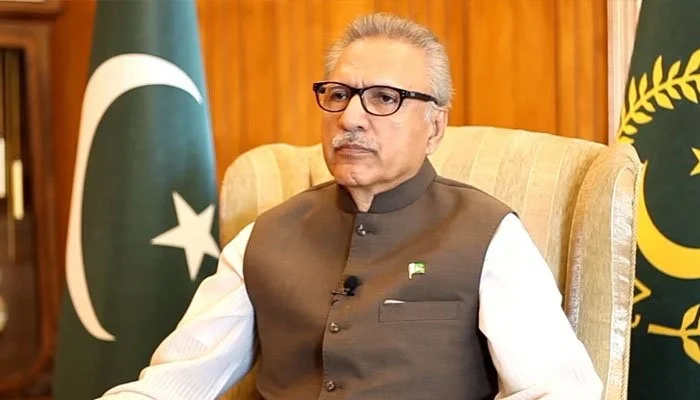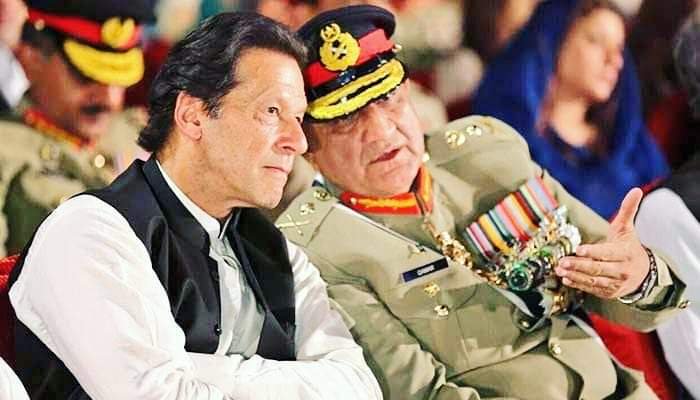
Social media caused differences b/w the establishment & Imran Khan: President Alvi
Says social media exacerbated disagreements & was given undue importance
Says Imran Khan was satisfied with the appointment of the new chief of the army staff
Says no messages had been conveyed between PTI & incumbent government in the past month
ISLAMABAD ( Web News )
President Dr. Arif Alvi on Thursday stated that “no one was flexible” between the establishment and the former ruling party Pakistan Tehreek-e-Insaf (PTI) prior to the vote of no-confidence moved against PTI Chief Imran Khan in April last year.
President Dr. Arif Alvi made the comment in an interview with “BBC Urdu” and maintained that social media caused differences between the establishment and former premier Imran Khan. He added that he had advised all parties to ignore everything, including social media as the economy was flourishing and there were good “undercurrents”.
President Dr. Arif Alvi on Thursday stated that “no one was flexible” between the establishment and the former ruling party Pakistan Tehreek-e-Insaf (PTI) prior to the vote of no-confidence moved against PTI Chief Imran Khan in April last year.
President Alvi stated that social media exacerbated disagreements and was given undue importance. He furthered said that social media increased polarisation and that “decision makers” were not “able to handle” social media and should try to handle it better.
“I have always tried to play my role and will continue to play my role to reduce disagreements between the establishment and political parties,” he continued.
President Alvi stated that social media exacerbated disagreements and was given undue importance. He furthered that social media increased polarisation and that “decision makers” were not “able to handle” social media and should try to handle it better.
He added that social media was “of course not” the only reason for contention between the PTI government and the establishment, and maintained that there were other reasons that he was not privy to, whereas some reasons were present in the press.
“I tried to resolve the matters through talks. I do not have an executive role so I try to take people forward and tell them that conversation is better than conflict, especially in a country like Pakistan. This is the advice I give publicly and privately,” he said.
“Worry about your matters, not social media, which is unimportant. How sad would it be if the books of history said Pakistan was pushed towards conflict due to social media?”
When asked if the conflict and misunderstanding started because of a senior military official the president refrained from commenting and stated that he would not “like to answer any particular direct references”.
He reiterated that his efforts in these matters were to forgive, however, people failed to understand the concept. He further stated that the entire political arena was out for revenge.
The interviewer then asked the president if PTI offered former army chief General (retd) Qamar Javed Bajwa a further extension on his tenure. To this, Alvi stated that he was unaware of the offers but did urge to reduce misunderstandings through dialogue.
“I am ready to play my role in bringing people closer, whether it be the establishment or my party or the government or opposition,” he said.
When asked if he retrospectively believed asking Imran Khan’s suggestion for the new COAS appointment was the right decision, the president asked “why not”.
“Why would I not take suggestions from a large, popular political party?” he questioned, highlighting that the constitution did not prevent him from doing so.
President Alvi said that “other suggestions were being taken from England” and that Imran Khan’s input was “genuine”.
He also declared that Imran Khan was satisfied with the appointment of the new chief of the army staff.
In response to another question, he stated that there were no current talks between the PTI and the establishment and no “recent” talks between Imran Khan and the incumbent coalition government.
“I am a public proponent of dialogue between Imran Khan and the current government, I keep trying. I feel as if the incumbent government has delayed it more, however, they have agreed with my stance but no results have come forth so far,” he said, adding that the PTI’s response to this suggestion was “public”.
The president said no messages had been conveyed between the PTI and the incumbent government in the past month.
He suggested that to end political issues, political parties should come together, construct a mandate and reduce temperatures of the political spectrum.
“Elections can happen early or late, that is for them to decide. However, a mandate should be created before the elections so that economic and national betterment can be worked upon”.
Commenting on the current government’s work for political betterment, Dr. Arif Alvi stated that efforts were underway and that he looked towards indicators to see economic growth.
“The world is still recovering from Covid and the Ukraine-Russia conflict, and then we [Pakistan] had political change. The time for elections is near which leads to lack of political stability as well,” he said, adding that he had encouraged political leaders to have dialogue for election clarity.
President Alvi also hoped that the talks between the ruling coalition and the International Monetary Fund (IMF) for the review of the ninth programme went well.
When asked if the corruption charges against the current regime should be investigated, the president stated that all corruption allegations should be investigated.
He lamented, however, that institutions for investigation were “politicised”.
Talking about the corruption charges against Imran Khan and his spouse, he furthered that “non-politicised investigation should be the law of Pakistan”. He added that the National Accountability Bureau (NAB) should be depoliticised.
On the recent uptick in leaked recordings, videos and photographs of political leaders, President Dr. Arif Alvi maintained that the leaks went against morality, Islam, and public trust.
“Unless the leaks are about terrorism or discuss significant criminality, they should not come out,” he said, questioning which law gave permission to record conversations.
He dubbed the ordeal “unfair” and said that a government organisation must look into it.
The president also expressed hope that the next elections would be transparent, despite the lack of Electronic Voting Machines (EVMs) and rights for overseas Pakistanis to vote.

